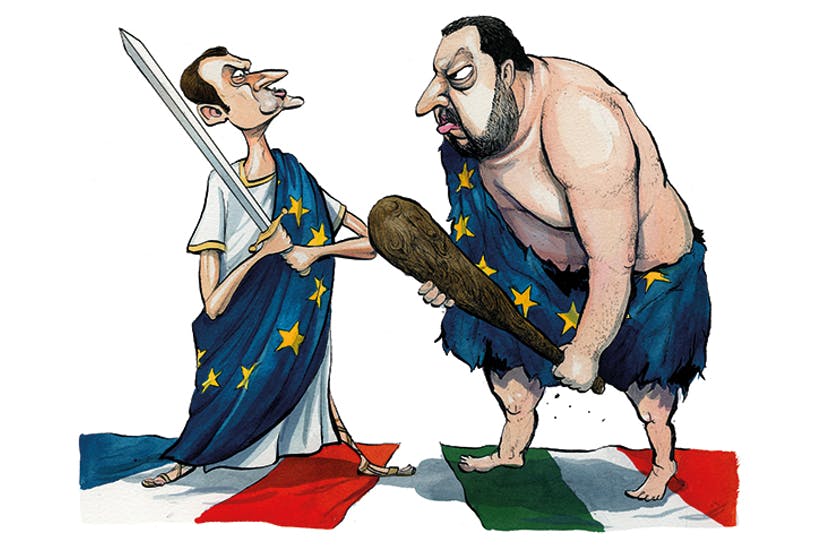French president Emmanuel Macron and Italy’s deputy prime minister Matteo Salvini don’t have much in common, but on the importance of the upcoming European elections they agree. For Macron, the vote will be “decisive for the future of our continent”. And for the leader of Italy’s right-wing populist Lega, “May 26 is a referendum between life and death. Those who are still sleeping should wake up.”
Yet Macron and Salvini are wrong. Both have misinterpreted these elections and their significance for Europe’s future. And the argument that these votes are a binary and existential struggle between pro-EU forces, led by Macron, and right-wing populists, led by Marine Le Pen and Salvini, is simplistic and self-serving. Put simply, it is aimed at firing up and mobilising European voters rather than representing what is really happening.
To get a more accurate picture of what these elections will mean for Europe, it is worth dividing the parties of the next European Parliament into three groups, according to their outlook for the future of the EU.
The two polar camps of “More Europe” and “Less Europe” are certainly real. The “More Europe” group is composed of parties like Macron’s La Republique En Marche, campaigning on a more integrationist platform for the EU and associate pro-Europeanism with a particular set of cultural values. They contain many centre-left parties that are relatively strong but losing ground domestically, as well as liberal and Green ones.
“Less Europe” accommodates a wide range of parties which represent different shades of Euroscepticism. Salvini-style populism is the dominant force within this camp, but by no means the only politics on show.
However there will also be a large and powerful third group which is content with the European status quo, though it supports incremental reform in some areas. This pro status quo, “Keep Calm and Carry on” group represents the view of most centre-right parties in the EU and is typified by German chancellor Angela Merkel’s approach on Europe. It is likely to be an obstacle to any grand, plans for deeper integration, as shown by Merkel’s lukewarm response to Macron’s vision.
This division between the “More Europe” and pro-status quo camps is not likely to be problematic insofar as European Parliament legislation is concerned. The European Parliament shares its decision making on matters such as the EU budget, energy, justice and trade deals with the European Council. In the last Parliament, the combined forces of the centre-right European People’s Party (EPP) and centre-left Progressive Alliance of Socialists and Democrats (S&D) have carried 74 per cent of legislation in a “Grand Coalition”. This despite the groups ostensibly being each others’ main rivals.
Although the EPP and S&D will lose their combined majority after the elections, the liberal pro-European ALDE group will be strengthened and help them to pass legislation. Yet on critical areas that the EU has left unresolved – such as migration or Eurozone changes, where individual member states ultimately decide – the “status quo” group in the European Council will likely resist many of the extensive changes proposed by Macron.
Meanwhile most polling suggests Eurosceptics will consolidate their 2014 gains, but will still be in a minority overall and will not be in a position to actually block legislation. Their expected strong performance will be an indication of growing dissatisfaction with the course of the European project, though Brexit has made big Eurosceptic parties abandon long-held pledges to leave the bloc. Eurosceptics of different shades can be divided into many sub-categories, as this Open Europe briefing highlights. But even the right-wing populist group that most Eurosceptic MEPs fall into is plagued by divisions on a host of matters, such as economic and foreign policy.
What’s more, some of the key policy disagreements within Eurosceptic groups cannot translate into hampering legislation, since the European Parliament does not have legislative power on matters such as Eurozone or migration reform. This ironically means that Eurosceptic MEPs will have little power to influence the key policy areas that they are campaigning on.
The Council, made up of national leaders, remains a more useful vehicle for change. So Eurosceptic gains in the European Parliament are indicative of discontent with EU handling of many issues, but are less significant in terms of practical consequences.
Internal divisions over the future direction of the EU will now be reflected in the composition of the next European Parliament. This will have minimal disruptive impact on the functioning of EU institutions and instead will mostly affect the Spitzenkandidat process for the selection of the next European Commission President.
So while the polarisation and fragmentation that has become entrenched in countries’ domestic political scenes will be mirrored in the next European Parliament, it would be a mistake to see these elections as a Manichean struggle for Europe between a Macron and Salvini camp. The reality for the direction of the European Union is far more complicated.
Zoe Alipranti works on EU politics at the think tank Open Europe






Comments